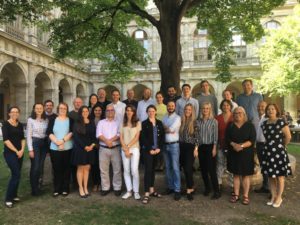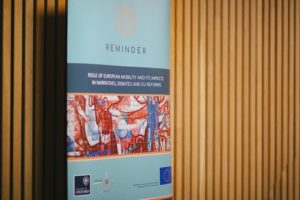REMINDER: Three Years of Exploring Migration in Europe
February 28, 2020
Putting together those that you know with those that you need
In 2015, a few us at the University of Oxford decided to put together a large project on migration within Europe. At that time, freedom of movement was being questioned by politicians, particularly in the United Kingdom. We started by contacting our existing collaborators across European universities. Soon we realise that while these were top scholars, we needed diversity and in particular given the subject of the call, needed experts in communications. Therefore, we contacted communication scholars and they decided to join, but also to bring their own collaborators across Europe. Finally, we have always valued the role of policy analysis at COMPAS and therefore recruited the top think tanks working on migration policy in Europe. In the end, we had a proposal with a large number of consortium partners, and a budget of close to EU 5 million, to spend over three years.
A different context
Several months later we got great news from our European Commission Project Officer, “the REMINDER proposal has been favourably evaluated.” After a few months we had complied with the necessary paperwork and were ready to start the research. However, two important events occurred between the submission of the proposal and the start of the project. First, the “migration crisis” in the Mediterranean caught the attention of policymakers and the EU public. While this actually started in 2015, its long-term political importance became clearer in 2016. Even Horizon 2020 calls changed the focus to forced migration, refugees and irregular migration. Discussions on freedom of movement were no longer a priority. Obviously, this was with the exception of the UK, which relates to our second event of importance. On the 23rd of June 2016, a majority of the British electorate voted to leave the European Union. These two events meant that the context in which we started the project and the one in which the proposal was conceived were very different.
Then we worked
It is not possible to list the academic contributions of REMINDER in a short blog. For that you are better off exploring this website and using our new fancy online tool (www.understandfreemovement.eu). However, let me highlight four key contributions: (1) the first comprehensive analysis of migration data to understand movement between EU countries; (2) the first estimate of the fiscal impact of migration within Europe; (3) the first large scale analysis of European news coverage of EU freedom of movement; (4) the first large scale analysis of European attitudes towards freedom of movement and their link with other policies and media.

Members of the REMINDER Consortium and Advisory Board, University of Vienna, September 2019
All good things must come to an end
Now after three years, the project has come to an end. This doesn’t mean that the work is done. We still have to convert project deliverables into journal publications, books, etc. But we will do this in our smaller groups and at our own pace, and not as a large consortium moving together. Still, the friendships created during the project and what we learned from each other will last for a long time.
Carlos Vargas-Silva is Director of the Centre on Migration, Policy and Society at the University of Oxford, and was Principal Investigator of the REMINDER Project.

